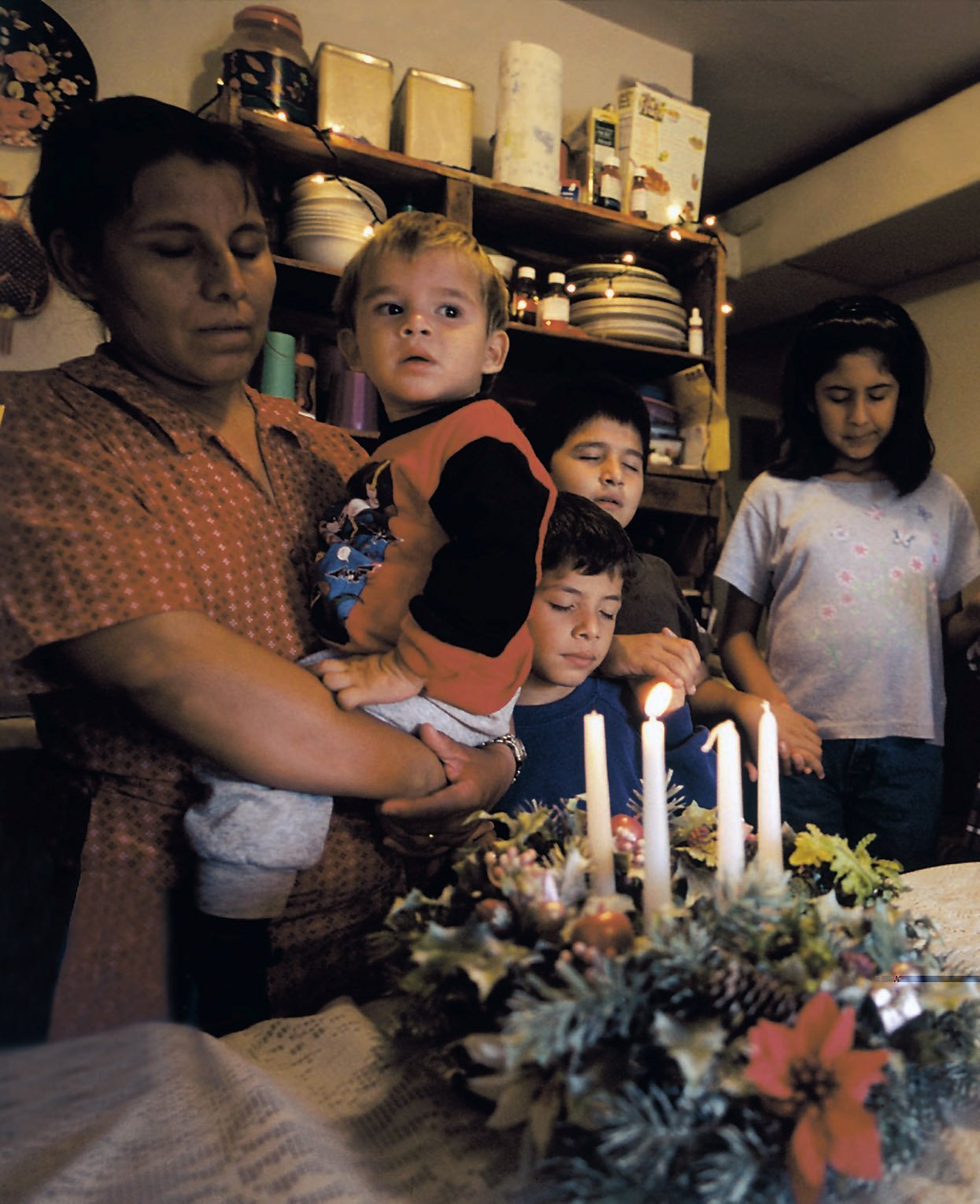
In this 2000 photo, Celsa Medellin and her children pray around a traditional Advent wreath in their home in Cameron Park, Texas. Waiting has always been a central theme of Advent. (CNS photo/James Bowey, Extension)
Waiting has always been a central theme of Advent. But who is it we wait for? The Messiah?
Is Our Lord Jesus not already here?
Before his death in 1968, Trappist monk Father Thomas Merton — in several of his spiritual writings — suggested that the purpose of Advent is not a matter of waiting for the Lord, but rather of recognizing his presence among us here and now.
“The fact remains that our task is to seek and find Christ in our world as it is and not as it might be,” Merton wrote in his essay, “Advent: Hope or Delusion?”
“The fact that the world is other than it might be,” he continued, “does not alter the truth that Christ is present in it and that his plan is neither frustrated nor changed: Indeed, all will be done according to his will. Our Advent is the celebration of this hope.”
What is “uncertain” Merton added, “is not the ‘coming’ of Christ but our own reception of him, our own response to him, our own readiness and capacity to ‘go forth to meet him.'”
Indeed, Matthew’s Gospel tells us that Jesus is present “where two or three are gathered together in my name” (18:20). Thus, we who call ourselves Jesus’ disciples are called to see Christ in one another, and to love them, as difficult as that may sometimes be — a reality Merton addressed in “No Man Is An Island.”
[hotblock]
“If we wait for some people to become agreeable or attractive before we begin to love them,” he wrote, “we will never begin.”
Thus, we need not wait for Advent or Christmas or any season or event of the liturgical year to heed Christ’s call to “love one another” (Jn 13:34). The responsorial psalm for the First Sunday of Advent offers us guidance:
“Your ways, O Lord, make known to me; teach me your paths. Guide me in your truth and teach me, for you are God my savior, and for you I wait all the day” (Ps 25:4-5).
This follows the day’s first reading from the prophet Jeremiah, six centuries before the coming of Christ, when “waiting for the Messiah” was truly a reality:
“The days are coming, says the Lord, when I will fulfill the promise I made to the house of Israel and Judah. In those days, in that time, I will raise up for David a just shoot; he shall do what is right and just in the land” (Jer 33:14-15).
“In Advent,” Merton wrote in “Hope or Delusion,” “we celebrate the coming and indeed the presence of Christ in our world.”
But, he added, that celebration must be tempered by the realization that the world in which Christ dwells is less than perfect.
“We witness to his presence even in the midst of all its inscrutable problems and tragedies,” Merton said. “Our Advent faith is not an escape from the world to a misty realm of slogans and comforts which declare our problems to be unreal, our tragedies inexistent.”
Which is why, in a particular way, Christ is most present to those who need him the most.
“Into this world, this demented inn, in which there is absolutely no room for him at all, Christ has come uninvited,” Merton wrote in “Raids on the Unspeakable.”
“But because he cannot be at home in it, because he is out of place in it, and yet he must be in it, his place is with those others for whom there is no room. His place is with those who do not belong, who are rejected by power because they are regarded as weak, those who are discredited, who are denied the status of persons, tortured, exterminated. With those for whom there is no room, Christ is present in this world.”
So wait no more.
***
Catholic journalist Mike Nelson writes from Southern California.
PREVIOUS: Vigilance can rustle ‘sleepy Christians’ from apathy, pope says
NEXT: Chesterton: Advent waiting is a gift


Share this story